education
education 的复数形式
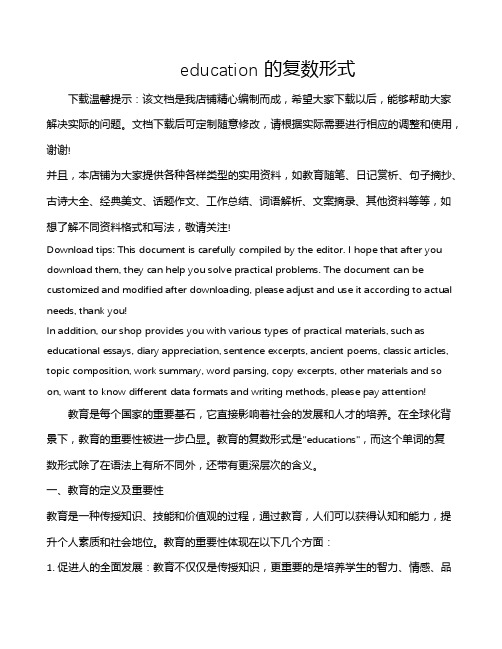
education 的复数形式下载温馨提示:该文档是我店铺精心编制而成,希望大家下载以后,能够帮助大家解决实际的问题。
文档下载后可定制随意修改,请根据实际需要进行相应的调整和使用,谢谢!并且,本店铺为大家提供各种各样类型的实用资料,如教育随笔、日记赏析、句子摘抄、古诗大全、经典美文、话题作文、工作总结、词语解析、文案摘录、其他资料等等,如想了解不同资料格式和写法,敬请关注!Download tips: This document is carefully compiled by the editor. I hope that after you download them, they can help you solve practical problems. The document can be customized and modified after downloading, please adjust and use it according to actual needs, thank you!In addition, our shop provides you with various types of practical materials, such as educational essays, diary appreciation, sentence excerpts, ancient poems, classic articles, topic composition, work summary, word parsing, copy excerpts, other materials and so on, want to know different data formats and writing methods, please pay attention!教育是每个国家的重要基石,它直接影响着社会的发展和人才的培养。
关于education英语作文

Education is a fundamental aspect of human development and societal progress.It is a lifelong process that starts from the early years of life and continues throughout ones existence.The purpose of education is to equip individuals with the knowledge,skills, and values necessary to function effectively in society and to contribute positively to the world.Importance of Education1.Personal Development:Education is crucial for personal growth.It helps individuals to develop critical thinking skills,problemsolving abilities,and selfawareness.It also fosters creativity and imagination,which are essential for innovation and progress.2.Social Mobility:Education is a key factor in social mobility.It provides individuals with the opportunity to improve their economic and social status by gaining access to better job opportunities and higher income levels.3.Cultural Understanding:Through education,individuals learn about different cultures, traditions,and histories.This understanding promotes tolerance,respect,and appreciation for diversity,which is vital in a globalized world.4.Civic Responsibility:Education instills a sense of civic responsibility.It teaches individuals about their rights and duties as citizens,encouraging them to participate actively in the democratic process and contribute to the betterment of society.5.Health and Wellbeing:Education plays a significant role in promoting health and wellbeing.It provides knowledge about personal hygiene,nutrition,and the importance of a healthy lifestyle,which can lead to better health outcomes.Challenges in EducationDespite its importance,the education sector faces numerous challenges:1.Access to Education:In many parts of the world,access to education is limited, particularly for girls and marginalized communities.Poverty,conflict,and social norms can prevent children from attending school.2.Quality of Education:Even where education is accessible,the quality can be poor. Overcrowded classrooms,inadequate teaching materials,and poorly trained teachers can hinder the learning process.cational Inequality:There is a significant disparity in educational opportunities and outcomes between different regions and social groups.This inequality can perpetuate social and economic divisions.4.Technological Integration:The rapid advancement of technology presents both opportunities and challenges for education.While it can enhance learning experiences,it also requires significant investment and training to ensure that all students can benefit from these advancements.The Role of Technology in Education1.Distance Learning:Technology enables distance learning,allowing students to access education from anywhere in the world.This is particularly beneficial for those who cannot attend traditional schools due to geographical or financial constraints.2.Personalized Learning:Educational technology can facilitate personalized learning experiences,catering to individual learning styles and paces.This can lead to more effective learning outcomes.3.Collaborative Learning:Technology fosters collaboration among students and educators,both within and across different educational institutions.This can enhance the learning experience and promote the exchange of ideas and knowledge.4.Assessment and Feedback:Technology can streamline the assessment process, providing immediate feedback to students and allowing educators to monitor progress more effectively.ConclusionEducation is a powerful tool for individual and societal development.It is essential to address the challenges faced by the education sector and to harness the potential of technology to enhance the learning experience.By doing so,we can ensure that education remains a cornerstone of progress and prosperity for all.。
education的作文

education的作文英文回答:Education is important for many reasons. Firstly, it provides us with knowledge and skills that are necessaryfor success in life. For example, I learned how to read and write in school, which has helped me communicateeffectively in my personal and professional life. Secondly, education opens up opportunities for us. With a good education, we have a better chance of finding a well-paying job and achieving our goals. Lastly, education helps us become more well-rounded individuals. Through learningabout different subjects, we gain a better understanding of the world around us.中文回答:教育对于我们来说非常重要。
首先,它为我们提供了在生活中取得成功所必需的知识和技能。
例如,我在学校学会了阅读和写作,这帮助我在个人和职业生活中有效沟通。
其次,教育为我们打开了机会。
通过良好的教育,我们更有可能找到一份薪水丰厚的工作并实现我们的目标。
最后,教育帮助我们成为更全面的个体。
通过学习不同的学科,我们更好地了解了周围的世界。
教育英语词汇大全

教育英语词汇大全教育是一个非常重要的领域,而在教育领域中,英语词汇是非常关键的一部分。
掌握丰富准确的教育英语词汇,可以帮助我们更好地理解和讨论教育相关的话题。
下面是一份教育英语词汇大全,希望能对大家的学习和教育工作有所帮助。
一、教育体制和机构(Educational systems and institutions)1. 学前教育(Pre-school education)2. 基础教育(Primary education)3. 中等教育(Secondary education)4. 高等教育(Higher education)5. 职业教育(Vocational education)6. 终身学习(Lifelong learning)7. 公立学校(Public schools)8. 私立学校(Private schools)9. 高校(Higher education institutions)10. 教育管理机构(Educational administrative agencies)二、教学方法和策略(Teaching methods and strategies)1. 课堂教学(Classroom teaching)2. 项目学习(Project-based learning)3. 合作学习(Cooperative learning)4. 个性化教育(Personalized education)5. 激励教育(Motivational education)6. 反思性教育(Reflective education)7. 游戏化教学(Gamified learning)8. 集体合作学习(Collaborative learning)9. 探究学习(Inquiry-based learning)10. 实践教学(Experiential learning)三、学科和课程(Subjects and curriculum)1. 数学(Mathematics)2. 英语(English)3. 科学(Science)4. 历史(History)5. 地理(Geography)6. 美术(Fine arts)7. 音乐(Music)8. 体育(Physical education)9. 计算机科学(Computer science)10. 社会学(Social studies)四、评估和考试(Assessment and examinations)1. 课堂测验(Classroom quizzes)2. 作业(Homework)3. 期中考试(Midterm examinations)4. 期末考试(Final examinations)5. 标准化考试(Standardized tests)6. 评估方法(Assessment methods)7. 成绩单(Report cards)8. 绩效评估(Performance evaluation)9. 学术成就(Academic achievements)10. 学习进步(Learning progress)五、教育政策和改革(Educational policies and reforms)1. 教育公平(Educational equity)2. 教育质量(Education quality)3. 教师培训(Teacher training)4. 教学改革(Curriculum reform)5. 教育投入(Education funding)6. 教育创新(Educational innovation)7. 教育发展(Education development)8. 教育法规(Educational laws and regulations)9. 国际交流与合作(International exchanges and cooperation)10. 双语教育(Bilingual education)总结:以上是教育英语词汇大全的内容,涵盖了教育领域中的各个方面,希望对您的学习和工作有所帮助。
英语作文education

英语作文educationEducation is important for everyone. It helps us to gain knowledge and skills that can be used in our daily lives. It also helps us to develop critical thinking and problem-solving abilities. Education is not just about learning from books, but also about learning from experiences and interactions with others.In school, we learn about different subjects such as math, science, history, and language. These subjects help us to understand the world around us and to develop a well-rounded perspective. We also learn important life skills such as communication, teamwork, and time management.Education is not limited to the classroom. We can also learn from our family, friends, and community. They can teach us valuable lessons about empathy, compassion, and resilience. Learning from others helps us to develop a sense of belonging and connection to the world.One of the most important aspects of education is the opportunity it provides for personal growth and self-discovery. Through education, we can explore our interests and passions, and develop a sense of purpose and direction in life. Education empowers us to pursue our dreams and achieve our goals.In conclusion, education plays a crucial role in shaping our lives and the world around us. It provides us with the knowledge, skills, and experiences that we need to thrive. Whether in school or in our everyday lives, education is a lifelong journey of learning and growth.。
教育是什么英文作文
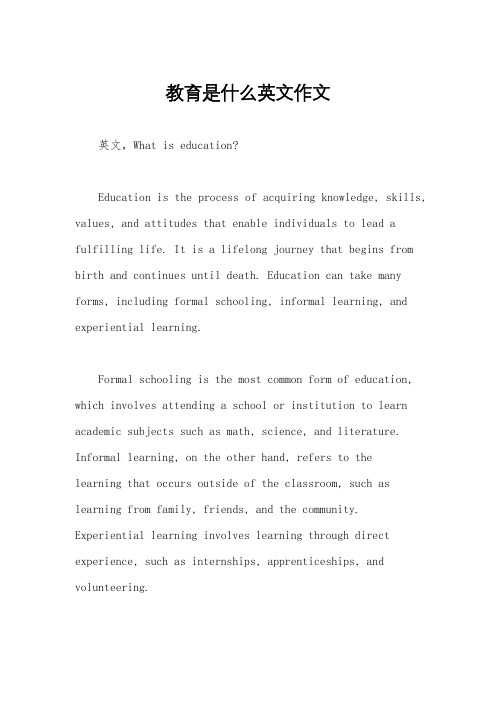
教育是什么英文作文英文,What is education?Education is the process of acquiring knowledge, skills, values, and attitudes that enable individuals to lead a fulfilling life. It is a lifelong journey that begins from birth and continues until death. Education can take many forms, including formal schooling, informal learning, and experiential learning.Formal schooling is the most common form of education, which involves attending a school or institution to learn academic subjects such as math, science, and literature. Informal learning, on the other hand, refers to thelearning that occurs outside of the classroom, such as learning from family, friends, and the community. Experiential learning involves learning through direct experience, such as internships, apprenticeships, and volunteering.Education is not just about acquiring knowledge and skills, but also about developing values and attitudes that enable individuals to become responsible and productive members of society. It helps individuals to developcritical thinking, problem-solving, and decision-makingskills that are essential for success in life.In short, education is a lifelong process of acquiring knowledge, skills, values, and attitudes that enable individuals to lead a fulfilling life and contribute to society.中文,教育是什么?教育是获取知识、技能、价值观和态度的过程,使个人能够过上充实的生活。
新概念英语第四册:Education教育
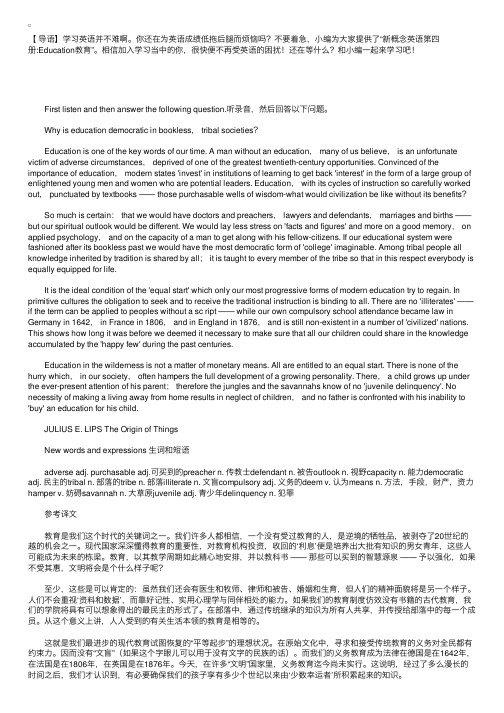
【导语】学习英语并不难啊。
你还在为英语成绩低拖后腿⽽烦恼吗?不要着急,⼩编为⼤家提供了“新概念英语第四册:Education教育”。
相信加⼊学习当中的你,很快便不再受英语的困扰!还在等什么?和⼩编⼀起来学习吧! First listen and then answer the following question.听录⾳,然后回答以下问题。
Why is education democratic in bookless, tribal societies? Education is one of the key words of our time. A man without an education, many of us believe, is an unfortunate victim of adverse circumstances, deprived of one of the greatest twentieth-century opportunities. Convinced of the importance of education, modern states 'invest' in institutions of learning to get back 'interest' in the form of a large group of enlightened young men and women who are potential leaders. Education, with its cycles of instruction so carefully worked out, punctuated by textbooks —— those purchasable wells of wisdom-what would civilization be like without its benefits? So much is certain: that we would have doctors and preachers, lawyers and defendants, marriages and births ——but our spiritual outlook would be different. We would lay less stress on 'facts and figures' and more on a good memory, on applied psychology, and on the capacity of a man to get along with his fellow-citizens. If our educational system were fashioned after its bookless past we would have the most democratic form of 'college' imaginable. Among tribal people all knowledge inherited by tradition is shared by all; it is taught to every member of the tribe so that in this respect everybody is equally equipped for life. It is the ideal condition of the 'equal start' which only our most progressive forms of modern education try to regain. In primitive cultures the obligation to seek and to receive the traditional instruction is binding to all. There are no 'illiterates' ——if the term can be applied to peoples without a sc ript —— while our own compulsory school attendance became law in Germany in 1642, in France in 1806, and in England in 1876, and is still non-existent in a number of 'civilized' nations. This shows how long it was before we deemed it necessary to make sure that all our children could share in the knowledge accumulated by the 'happy few' during the past centuries. Education in the wilderness is not a matter of monetary means. All are entitled to an equal start. There is none of the hurry which, in our society, often hampers the full development of a growing personality. There, a child grows up under the ever-present attention of his parent; therefore the jungles and the savannahs know of no 'juvenile delinquency'. No necessity of making a living away from home results in neglect of children, and no father is confronted with his inability to 'buy' an education for his child. JULIUS E. LIPS The Origin of Things New words and expressions ⽣词和短语 adverse adj. purchasable adj.可买到的preacher n. 传教⼠defendant n. 被告outlook n. 视野capacity n. 能⼒democratic adj. 民主的tribal n. 部落的tribe n. 部落illiterate n. ⽂盲compulsory adj. 义务的deem v. 认为means n. ⽅法,⼿段,财产,资⼒hamper v. 妨碍savannah n. ⼤草原juvenile adj. 青少年delinquency n. 犯罪 参考译⽂ 教育是我们这个时代的关键词之⼀。
education短语
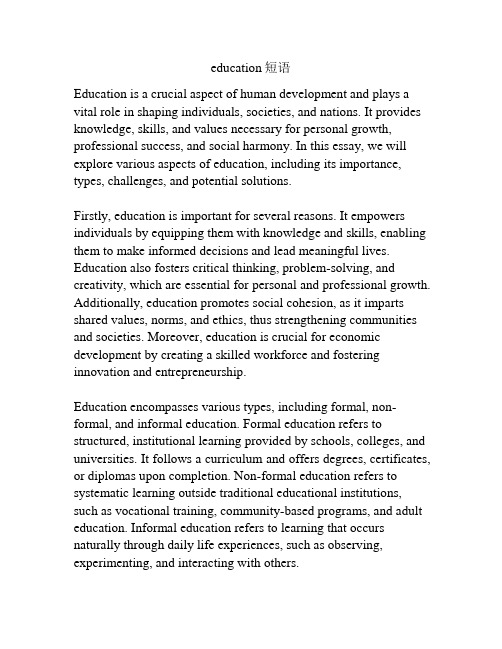
education短语Education is a crucial aspect of human development and plays a vital role in shaping individuals, societies, and nations. It provides knowledge, skills, and values necessary for personal growth, professional success, and social harmony. In this essay, we will explore various aspects of education, including its importance, types, challenges, and potential solutions.Firstly, education is important for several reasons. It empowers individuals by equipping them with knowledge and skills, enabling them to make informed decisions and lead meaningful lives. Education also fosters critical thinking, problem-solving, and creativity, which are essential for personal and professional growth. Additionally, education promotes social cohesion, as it imparts shared values, norms, and ethics, thus strengthening communities and societies. Moreover, education is crucial for economic development by creating a skilled workforce and fostering innovation and entrepreneurship.Education encompasses various types, including formal, non-formal, and informal education. Formal education refers to structured, institutional learning provided by schools, colleges, and universities. It follows a curriculum and offers degrees, certificates, or diplomas upon completion. Non-formal education refers to systematic learning outside traditional educational institutions, such as vocational training, community-based programs, and adult education. Informal education refers to learning that occurs naturally through daily life experiences, such as observing, experimenting, and interacting with others.Despite its importance, education faces several significant challenges. One such challenge is the disparity in access to education. Many individuals, particularly in marginalized communities and developing countries, do not have equal opportunities to receive quality education. This perpetuates social inequalities and hinders overall development. Another challenge is the quality of education, as outdated teaching methods, inadequate infrastructure, and poorly trained teachers contribute to subpar educational outcomes. Moreover, education often fails to adapt to the rapidly changing needs of the modern world, such as the demand for new skills in the digital era.To address these challenges, various potential solutions have been proposed. One solution is to increase investment in education, ensuring adequate funding for infrastructure, teaching resources, teacher training, and facilities. Governments and international organizations must prioritize education and allocate sufficient resources to improve access and quality. Additionally, educational reforms are necessary to modernize the curriculum, pedagogy, and assessment methods. This includes incorporating technology in education, promoting interactive and experiential learning, and fostering lifelong learning skills. Furthermore, partnerships between governments, civil society, and private sectors can contribute to innovative approaches in education, such as public-private partnerships and community-driven initiatives.In conclusion, education is of paramount importance for personal, social, and economic development. It empowers individuals, fosters social cohesion, and drives economic growth. However, education faces challenges related to access, quality, and relevance.By increasing investment in education, implementing educational reforms, and fostering partnerships, we can overcome these challenges and ensure that education remains a transformative force in shaping a better future for individuals and societies.。
education英文解释

education英文解释
education,英文单词,名词,作名词时意为“教育;培养;教育学”。
education单词发音英[ˌedʒʊˈkeɪʃn]美[ˌedʒuˈkeɪʃn] education短语搭配liberal education 通识教育; 博雅教育; 自由教育; 通才教育vocational education [社科] 职业教育; 高职教育; 高职院校; 中职教育Waldorf Education 华德福教育; 华德福教育理念; 华德福; 华德福教诲tertiary education 高等教育; 专上教育; 大学教育Public Education 公共教育; 大众宣传; 公立教育; 公共教育学Comparative Education [社科] 比较教育学; 比较教育; 比力教诲学; 教育学moral education 德育; 道德教育; 德育教育; 品德教育quality education 素质教育; 高职教育; 优质教育; 高校体育Art Education 艺术教育; 美术教育; 美育; 艺术。
education
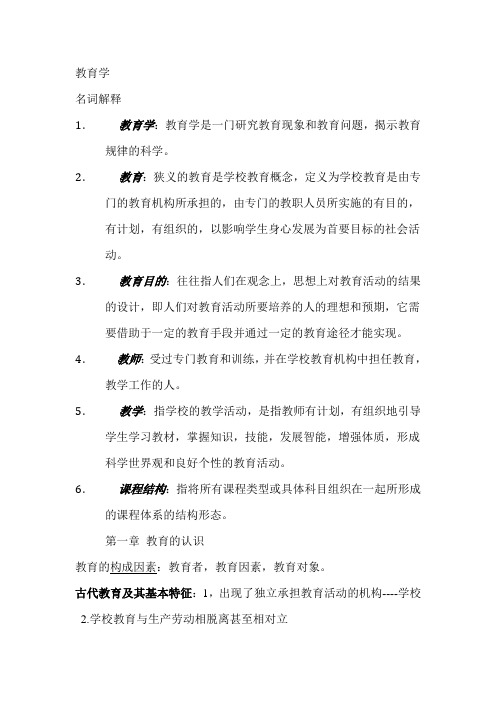
教育学名词解释1.教育学:教育学是一门研究教育现象和教育问题,揭示教育规律的科学。
2.教育:狭义的教育是学校教育概念,定义为学校教育是由专门的教育机构所承担的,由专门的教职人员所实施的有目的,有计划,有组织的,以影响学生身心发展为首要目标的社会活动。
3.教育目的:往往指人们在观念上,思想上对教育活动的结果的设计,即人们对教育活动所要培养的人的理想和预期,它需要借助于一定的教育手段并通过一定的教育途径才能实现。
4.教师:受过专门教育和训练,并在学校教育机构中担任教育,教学工作的人。
5.教学:指学校的教学活动,是指教师有计划,有组织地引导学生学习教材,掌握知识,技能,发展智能,增强体质,形成科学世界观和良好个性的教育活动。
6.课程结构:指将所有课程类型或具体科目组织在一起所形成的课程体系的结构形态。
第一章教育的认识教育的构成因素:教育者,教育因素,教育对象。
古代教育及其基本特征:1,出现了独立承担教育活动的机构----学校2.学校教育与生产劳动相脱离甚至相对立3.学校教育表现出典型的等级性,专制性和保守性现代教育及其基本特征:1.现代教育与社会生产和社会生活日趋结合2.现代教育的民主化。
3.现代教育追求鲜明的民主化4.现代教育的终身化5.现代教育的国际化。
赫尔巴特《普通教育学》、《教育学讲授纲要》“现代教育学之父”和“科学教育学的奠基人,夸美纽斯《大教学论》(普及教育的民主主张,认为“所有男女青年,不论富贵和贫贱,都应该进学校”。
为了实现这一主张,他创制了学校体系,发明了班级授课制,这种主张和体系至今为我们所沿用。
在《大教学论》中,夸美纽斯对教学内容,方法及其艺术进行了详细的分析和说明,提出了一套教学原则,如直观性原则,循序渐进性原则,巩固性原则等,奠定了教学论的理论基础。
这一巨著,以它不朽的思想,经过300多年的考验,成为现代教育、教学理论的精华和核心。
),杜威《民主主义与教育学》(教育在本质上,就是社会维系其存在与发展的一种历程,但是,教育在形式上,却不应孤立于社会生存与发展的环境之外,这一基本的认识,可以概括了杜威整个教育与社会之间关系的确定。
英语短文阅读:教育 Education
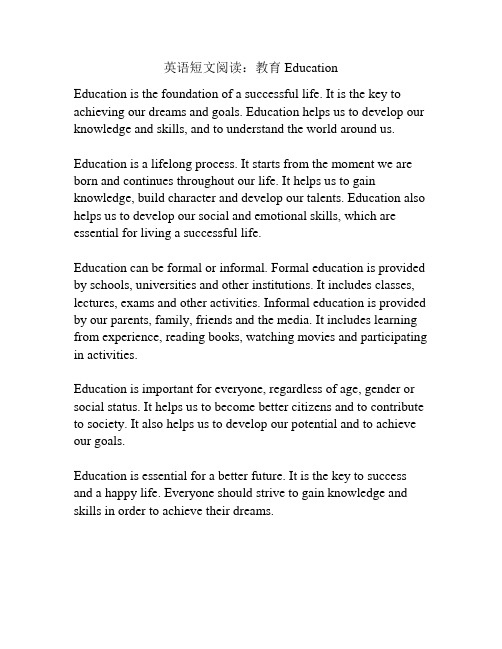
英语短文阅读:教育 EducationEducation is the foundation of a successful life. It is the key to achieving our dreams and goals. Education helps us to develop our knowledge and skills, and to understand the world around us.Education is a lifelong process. It starts from the moment we are born and continues throughout our life. It helps us to gain knowledge, build character and develop our talents. Education also helps us to develop our social and emotional skills, which are essential for living a successful life.Education can be formal or informal. Formal education is provided by schools, universities and other institutions. It includes classes, lectures, exams and other activities. Informal education is provided by our parents, family, friends and the media. It includes learning from experience, reading books, watching movies and participating in activities.Education is important for everyone, regardless of age, gender or social status. It helps us to become better citizens and to contribute to society. It also helps us to develop our potential and to achieve our goals.Education is essential for a better future. It is the key to success and a happy life. Everyone should strive to gain knowledge and skills in order to achieve their dreams.。
education-英语作文
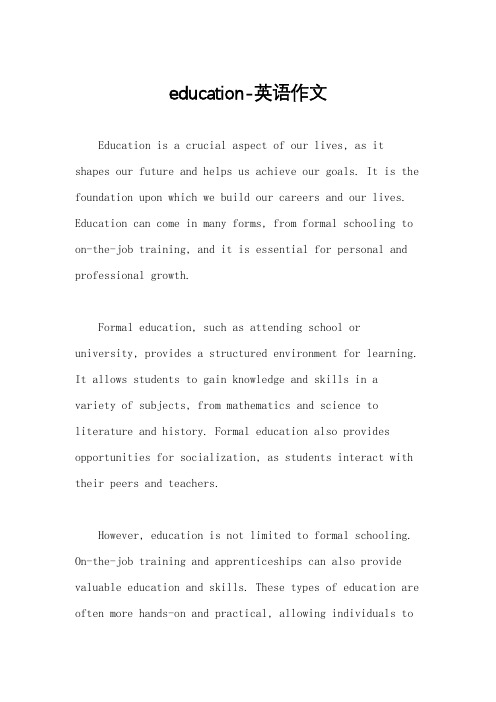
education-英语作文Education is a crucial aspect of our lives, as it shapes our future and helps us achieve our goals. It is the foundation upon which we build our careers and our lives. Education can come in many forms, from formal schooling to on-the-job training, and it is essential for personal and professional growth.Formal education, such as attending school or university, provides a structured environment for learning. It allows students to gain knowledge and skills in avariety of subjects, from mathematics and science to literature and history. Formal education also provides opportunities for socialization, as students interact with their peers and teachers.However, education is not limited to formal schooling. On-the-job training and apprenticeships can also provide valuable education and skills. These types of education are often more hands-on and practical, allowing individuals togain experience and knowledge in a specific field.Regardless of the type of education, it is important to remember that education is a lifelong pursuit. Learning should not stop once formal schooling is complete, as there is always more to learn and new skills to acquire. Continued education can help individuals stay current in their field and advance their careers.In conclusion, education is a vital part of our lives and is essential for personal and professional growth. Whether through formal schooling or on-the-job training, education provides opportunities for learning and skill development. It is important to remember that education is a lifelong pursuit and that there is always more to learn.。
关于教育的英文单词

关于教育的英文单词英语的学习,词汇量的积累很重要,有关教育方面的词汇你了解多少呢,下面是店铺整理的关于教育的英文单词,希望对大家有帮助。
关于教育的英文单词办教育to run/develop education; to run a school初等教育primary education; elementary education电化教育audio-visual instruction (program); education with electrical audiovisual aids儿童教育education for children高等教育211工程the "211 Project" for higher education高等教育自学考试self-study higher education examination公民教育 citizenship education继续教育 further education家庭教育family education; home education; domestic (or family) upbringingeducational history 学历educational background 教育程度educational system 学制 academic year 学年term/ semester 学期 diploma 文凭 tuition 学费School 学校fee-paying school 付费学校/私立学校public school 公立学校 regular school 普通学校primary/elementary school 小学high/middle school 中学 university 大学 college 学院academy 高等专科院校 normal school 师范院校Curriculum 课程courses taken 所修的课程 major 主修课minor 辅修课specialized course 专业课 compulsory course 必修课 optional course 选修课Activities 各项活动 social practice 社会实践extracurricular activities 课外活动 physical activities 体育活动recreational activities 娱乐活动academic activities 学术活动social activities 社会活动Rewards 奖励scholarship 奖学金教育方面的英语词汇excellent League member 优秀团员 excellent leader 优秀干部"Three Goods" student 三好学生Faculty and Students 教师和学生principal 中学校长(美) headmaster 中小学校长(英) master 小学校长(美)Party branch secretary 党支部书记League branch secretary 团支部书记commissary in charge of organization 组织委员 commissary in charge of publicity 宣传委员dean of studies 教务处长dean of students 教导主任department chairman 系主任 professor 教授associate professor 副教授 guest professor 客座教授 lecturer 讲师teaching assistant 助教 supervisor 论文导师 post doctorate 博士后doctor(Ph.D) 博士 master 硕士 bachelor 学士graduate student 研究生abroad student 留学生undergraduate 本科生government-supported student 公费生educational history 学历educational background 教育程度supervisor 论文导师university 大学compulsory course 必修课educational system 学制academic year 学年term/ semester 学期diploma 文凭School 学校fee-paying school 付费学校/私立学校public school 公立学校tuition 学费regular school 普通学校primary/elementary school 小学high/middle school 中学college 学院academy 高等专科院校normal school 师范院校Curriculum 课程courses taken 所修的课程major 主修课minor 辅修课specialized course 专业课optional course 选修课Activities 各项活动social practice 社会实践social activities 社会活动extracurricular activities 课外活动physical activities 体育活动recreational activities 娱乐活动academic activities 学术活动Rewards 奖励abroad student 留学生commoner 自费生scholarship 奖学金excellent League member 优秀团员repeater 留级生excellent leader 优秀干部"Three Goods" student 三好学生Faculty and Students 教师和学生headmaster 中小学校长(英)master 小学校长(美) doctor(Ph.D) 博士principal 中学校长(美)Party branch secretary 党支部书记League branch secretary 团支部书记commissary in charge of organization 组织委员dean of studies 教务处长commissary in charge of publicity 宣传委员dean of students 教导主任department chairman 系主任professor 教授associate professor 副教授guest professor 客座教授lecturer 讲师teaching assistant 助教master 硕士bachelor 学士graduate student 研究生undergraduate 本科生government-supported student 公费生day-student 走读生boarder 寄宿生evening student 夜校生guest student 旁听生(英)/auditor 旁听生(美) master 男教师post doctorate 博士后alumnus 校友freshman 大学一年级学生sophomore 大学二年级/高中一年级学生junior 大学三年级/高中二年级学生senior 大学四年级/高中三年级学生关于教育的英文单词:Activities 各项活动social practice 社会实践extracurricular activities 课外活动physical activities 体育活动recreational activities 娱乐活动academic activities 学术活动social activities 社会活动。
KET单词分类学习:Education
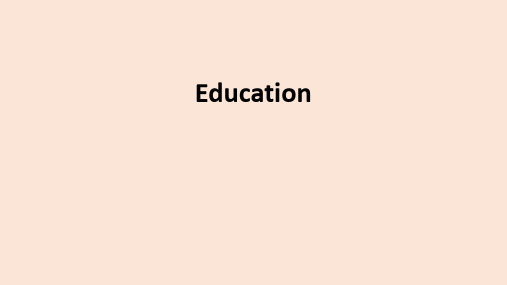
• 例句:I'm doing some research on the subject. 我正就这一课题进行研究。
teach [tiːtʃ]
你能教我干那活儿吗?
teacher [ˈtiːtʃə(r)]
• 词性:名词 n. • 英文释义:1. a person whose job is teaching, especially in a
school • 中文释义:教师;教员;老师;先生 • 例句: The new teacher really brought French to life for us.
• 中文释义:测验;考查;(医疗上的)检查,化验,检验;试验;测试 测验;考查;试验;检查;化验;检验;测试
• 例句: Tests have shown high levels of pollutants in the water. 测试显示水中污染物质的含量很高。
university [ˌjuːnɪˈvɜːsəti]
• 词性:动词v. • 英文释义:1. to give lessons to students in a school, college, university,
etc.; to help sb learn sth by giving information about it 2. to make sb feel or think in a different way 3. to show sb how to do sth so that they will be able to do it themselves • 中文释义:教(课程);讲授;教授;教;训练;教育;教导;使懂得(情理) • 例句: Could you teach me to do that?
教育的英语单词

教育的英语单词关于教育的英语单词集合教育也是一种教书育人的过程,可将一种最客观的理解教予他人,而后在自己的生活经验中得以自己所认为的价值观。
以下是店铺精心整理的关于教育的英语单词集合,供大家参考借鉴,希望可以帮助到有需要的朋友。
1、教育(education)2、获取知识 acquire knowledge3、高等教育 higher education4、远程教育 tele-education5、素质教育 quality-orientededucation6、知识的来源 source of knowledge7、课外活动 extracurricul8、学费 tuition9、奖学金 scholarship,grant10、教学大纲 syllabus11、学前教育 preschool education12、男女同校 co-education13、穿校服 school unifonn14、参加入学考试 take an entranceexamination15、教育工作者 teaching staff16、导师 tutor( advise)17、传授知识 impart knowledge18、提高教学效果 improveteachers perfonnance19、培养能力 foster ones capability20、塑造性格 shape(mold) childrens characters21、培养孩子的协作精神 fosterchildren22、使天生的想象力得到训练have ones innate powers of imagination trained23、有助于个性的发展facilitate the development of individuality24、在较好的环境中长大grow up under more favorable circumstances25、接受必要的教育 receive adequate education26、受过良好教育 well -educated27、适应性强 well-adapted28、取长补短 learn from each other ~ s strengths to offset their owq weaknesses29、智商IQ (intelligence quotient)30、充分发挥 bring into full play have a wide range of skills31、发挥创造潜能use ones creative potential; add to our knowledge about32、设施齐全 (kindergarten)well-equipped facilities33、上课 attend class34、学习成绩 academic performance35、平均分 average score36、从事兼职工作 take part-time job37、体罚 corporal punishment38、差生 inferiorstudents39、把孩子看扁 condemn a child40、过度宠爱 excessive permissiveness41、为负责 be held responsible for42、承担义务assumethe obligation a sense of responsibility( obligation)43、推卸责任 pass the buck(to), shirk ones obligations44、父母子女关系 parent-child relationship45、报答父母 repay ones parents46、人才 talented person47、精英 elite48、本科生 undergraduate49、毕业生 graduate50、研究生 postgraduate51、博士 doctor52、博士学位 doctorate53、博士后 postdoctoral54、证书 diploma,credential拓展阅读:背单词的四种方法一、词语搭配法词语搭配法有两个元素,collocation和context,前者是指单词的惯用搭配,后者指的是语境,通俗点讲就是上下文对于collocation,也就是常用搭配,记住它不仅可以有效记住词而且让你的英语更加地道。
有关Education的高分词汇
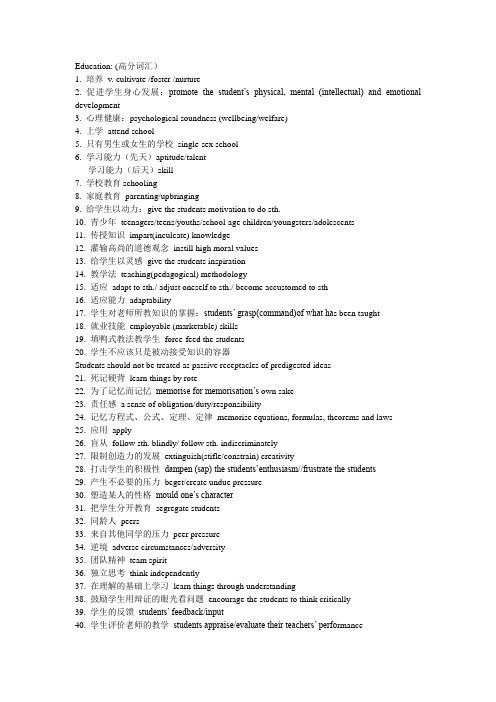
Education: (高分词汇)1. 培养v. cultivate /foster /nurture2. 促进学生身心发展:promote the student’s physical, mental (intellectual) and emotional development3. 心理健康:psychological soundness (wellbeing/welfare)4. 上学attend school5. 只有男生或女生的学校single-sex school6. 学习能力(先天)aptitude/talent学习能力(后天)skill7. 学校教育schooling8. 家庭教育parenting/upbringing9. 给学生以动力:give the students motivation to do sth.10. 青少年teenagers/teens/youths/school-age children/youngsters/adolescents11. 传授知识impart(inculcate) knowledge12. 灌输高尚的道德观念instill high moral values13. 给学生以灵感give the students inspiration14. 教学法teaching(pedagogical) methodology15. 适应adapt to sth./ adjust oneself to sth./ become accustomed to sth16. 适应能力adaptability17. 学生对老师所教知识的掌握:students’ grasp(command)of what ha s been taught18. 就业技能employable (marketable) skills19. 填鸭式教法教学生force-feed the students20. 学生不应该只是被动接受知识的容器Students should not be treated as passive receptacles of predigested ideas21. 死记硬背learn things by rote22. 为了记忆而记忆memorise for memorisation’s own sake23. 责任感a sense of obligation/duty/responsibility24. 记忆方程式、公式、定理、定律memorise equations, formulas, theorems and laws25. 应用apply26. 盲从follow sth. blindly/ follow sth. indiscriminately27. 限制创造力的发展extinguish(stifle/constrain) creativity28. 打击学生的积极性dampen (sap) the students’enthusiasm//frustrate the students29. 产生不必要的压力beget/create undue pressure30. 塑造某人的性格mould one’s character31. 把学生分开教育segregate students32. 同龄人peers33. 来自其他同学的压力peer pressure34. 逆境adverse circumstances/adversity35. 团队精神team spirit36. 独立思考think independently37. 在理解的基础上学习learn things through understanding38. 鼓励学生用辩证的眼光看问题encourage the students to think critically39. 学生的反馈students’ feedback/input40. 学生评价老师的教学students appraise/evaluate their teachers’ perfo rmance41. 各门功课总称curriculum42.具体一门课的内容syllabus43. 课外活动extra-curricular activities44. 学校是社会的缩影a school is society in miniature45. 不遵守纪律n. indiscipline/misbehaviour/mischief46. 违反纪律的学生disruptive students/unruly students47. 理论知识theoretical knowledge48. 通才generalist49. 专才specialist50. 全面发展的well-rounded/versatile51. 为社会健康发展做贡献contribute to our communities and society as a whole52. 人文科学humanities53. 社会科学social sciences54. 艺术arts55. 文科总称liberal studies/arts56. 理科sciences57. 工科engineering58. 学科(通称)discipline59. 基础科学basic sciences60. 应用科学applied sciences61. 小(中、大)学教育primary-level/secondary-level/tertiary-level education62. 职业教育vocational education/training。
education英语作文
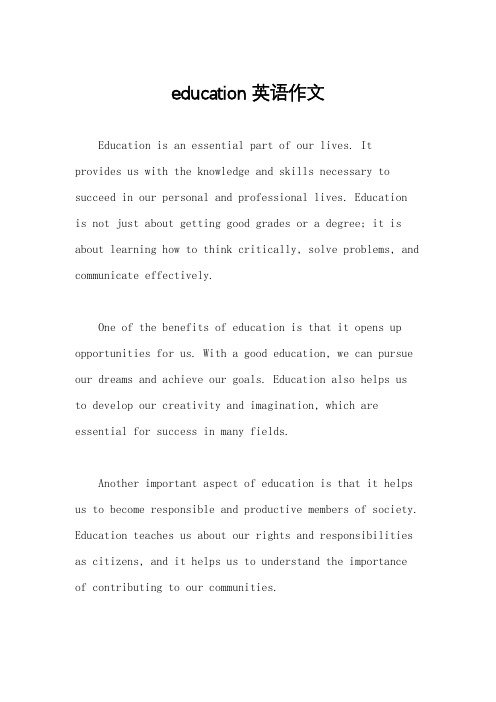
education英语作文Education is an essential part of our lives. It provides us with the knowledge and skills necessary to succeed in our personal and professional lives. Educationis not just about getting good grades or a degree; it is about learning how to think critically, solve problems, and communicate effectively.One of the benefits of education is that it opens up opportunities for us. With a good education, we can pursue our dreams and achieve our goals. Education also helps us to develop our creativity and imagination, which are essential for success in many fields.Another important aspect of education is that it helps us to become responsible and productive members of society. Education teaches us about our rights and responsibilities as citizens, and it helps us to understand the importance of contributing to our communities.In addition to these benefits, education also helps usto develop our social skills. Through education, we learn how to interact with others, how to work in teams, and howto communicate effectively. These skills are essential for success in both our personal and professional lives.Finally, education helps us to become lifelong learners. Learning is a continuous process, and education provides us with the tools and resources we need to continue learning throughout our lives. By continuing to learn and grow, we can stay relevant and competitive in today's rapidly changing world.In conclusion, education is essential for our personal and professional development. It opens up opportunities, helps us to become responsible and productive members of society, develops our social skills, and enables us to become lifelong learners.。
- 1、下载文档前请自行甄别文档内容的完整性,平台不提供额外的编辑、内容补充、找答案等附加服务。
- 2、"仅部分预览"的文档,不可在线预览部分如存在完整性等问题,可反馈申请退款(可完整预览的文档不适用该条件!)。
- 3、如文档侵犯您的权益,请联系客服反馈,我们会尽快为您处理(人工客服工作时间:9:00-18:30)。
Most of the countries in the world value education. why? beacause education is the basic of a country .nobody can deny the importance of education. a person ,who has been educated ,know much knowlegde than others . if every civilian in a country can be educated ,the country would be very rich and civilised.and the civilian of the country must be very happy ,because they not only have money they also have knowlegde.
The aim of education is that increase the person's knowledge and skills, influence people ideological and moral activities, strengthen people's physical activity.
As we know ,most people in our country has been educated .i think this is the reason why our country has developed so fast in recent years.
The meaning of education is great.please everyone value it by your hely belived that education is of great importance.as for the whole human beings,the aim of education is to make the knowledge we gain hard past from generation to generation.so that the society can develop quickly and continually.moreover,it makes sure that our generations can live a better life,at least,a life not worse than us.then our human beings would be able to exist for good.and as for every individual,education aims to give us the skills of living.what's more education should also tell us what people we ought to be.it should aim to make us grow into a person with superior qualies,like discipline,perseverance,politeness and so on.
